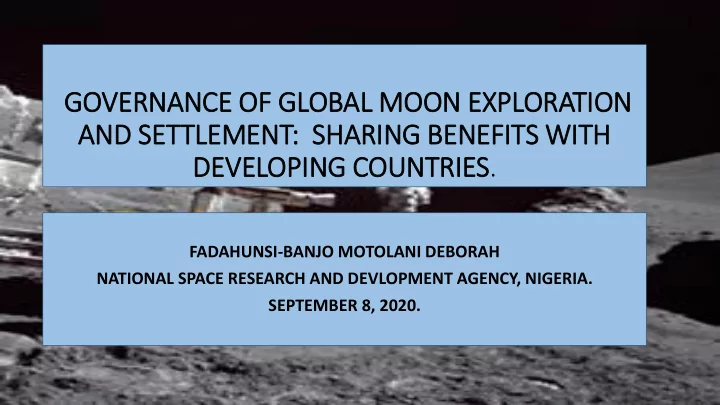

GOVERNANCE OF GLOBAL MOON EXPLORATION AND SETTLEMENT: : S SHARING BENEFITS WIT ITH DEVELOPING COUNTRIES. FADAHUNSI-BANJO MOTOLANI DEBORAH NATIONAL SPACE RESEARCH AND DEVLOPMENT AGENCY, NIGERIA. SEPTEMBER 8, 2020.
GOVERNANCE OF GLOBAL MOON EXPLORATION AND SETTLEMENT: THE DEVELOPING COUNTRIES’ PERSPECTIVE • Article I of the Outer Space Treaty 1967 • The exploration and use of outer space, including the Moon and other celestial bodies, shall be carried out for the benefit and in the interests of all countries, irrespective of their degree of economic or scientific development, and shall be the province of all mankind.
ITH THE DEVELOPING COUNTRIES . BENEFIT SHARING WIT • What are the benefits? • Resources Resources • Technology. • Collaboration • LAW. BENEFITS International Technology cooperation LEGISLATION
BENEFIT SHARING : : HOW? • Establish a resource reservoir to create a level playing field for capacity building. • Conservation of mineral resources in space bearing in mind the heritage of mankind principle. • The United Nations Convention on the Laws of the Sea 1982. • Mining lease.
CONCERNS/CHALLENGES • Article II Outer Space Treaty: • Outer space, including the Moon and other celestial bodies, is not subject to national appropriation by claim of sovereignty, by means of use or occupation, or by any other means. • Governing laws • National legislation – vs-International law • Environmental issues. Space Debris. • Regulation of settlements and settlers . • Funding • Technology Transfer
CONCLUSION • Although Nigeria is currently more inclined towards space science/technology application and impacting her citizens directly, projects are in place to ensure transitioning into deep space exploration. • Interpretation of benefit sharing from the developing countries implies sharing both the resources and the technology. • Developing countries are keen about being part of the process, hence open to collaborating with other countries.
Recommend
More recommend